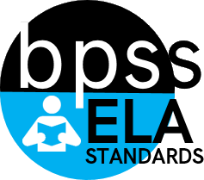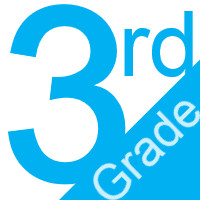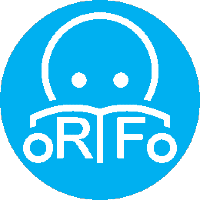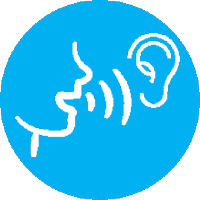BPS District English Standards Book
K-12 Grade Levels
Grade 03

3rd Grade English
"I can ... statements"
![]()
![]()
![]()
![]()
![]()
![]()
 Third grade is a pivotal year for your child. Learning to read with fluency and confidence will serve as a foundation for the reading demands in later grades. By practicing with learning-to-read strategies, your child will reliably be able to
make sense of multisyllable words in books. He or she will come to appreciate that words have meanings that are not literal (e.g., a piece of cake) and have relationships to other words (e.g., company and companion). Recognizing and understanding
words will help your child read increasingly challenging stories and books and build knowledge about the world around him or her. By the end of the year, your child also will be writing clear sentences and paragraphs on a range of topics, drawing
on an expanding vocabulary.
Third grade is a pivotal year for your child. Learning to read with fluency and confidence will serve as a foundation for the reading demands in later grades. By practicing with learning-to-read strategies, your child will reliably be able to
make sense of multisyllable words in books. He or she will come to appreciate that words have meanings that are not literal (e.g., a piece of cake) and have relationships to other words (e.g., company and companion). Recognizing and understanding
words will help your child read increasingly challenging stories and books and build knowledge about the world around him or her. By the end of the year, your child also will be writing clear sentences and paragraphs on a range of topics, drawing
on an expanding vocabulary.
Prioritized Standards Identifiers are highlighted a sky-blue.
ELA-03.RL  Reading Literature Strand
Reading Literature Strand
- ELA-03.RL.01 Ask and answer questions to demonstrate understanding of a text, referring explicitly to the text as the basis for the answers.
- ELA-03.RL.02 Recount stories, including fables, folktales, and myths from diverse cultures to determine the central message, lesson, or moral and explain how it is conveyed through key details in the text.
- ELA-03.RL.03 Describe characters in a story and their actions.
- ELA-03.RL.04 Determine the meaning of words and phrases as they are used in a text, distinguishing literal from nonliteral language.
- ELA-03.RL.05 Refer to parts of stories, dramas, and poems when writing or speaking about a text, using terms such as chapter, scene, and stanza; describe how each successive part builds on earlier sections.
- ELA-03.RL.06 Distinguish their own point of view from that of the narrator or those of the characters.
- ELA-03.RL.07 Explain how specific aspects of a text's illustrations contribute to what is conveyed by the words in a story.
- ELA-03.RL.08 Not applicable to literature
- ELA-03.RL.09 Compare and contrast the themes, settings, and plots of stories written by the same author about the same or similar characters.
- ELA-03.RL.10 By the end of the year, read and comprehend literature, including stories, dramas, and poetry, on grade level independently and proficiently.
ELA-03.RI  Reading Information Strand
Reading Information Strand
- ELA-03.RI.01 Ask and answer questions to demonstrate understanding of a text, referring explicitly to the text as the basis for the answers.
- ELA-03.RI.02 Determine the main idea of a text and recount the key details to explain how they support the main idea.
- ELA-03.RI.03 Describe the relationship between a series of historical events, scientific ideas or concepts, or steps in technical procedures in a text, using language that pertains to time, sequence, and cause/effect.
- ELA-03.RI.04 Determine the meaning of general academic and domain specific words and phrases in a text relevant to a grade 3 topic or subject area.
- ELA-03.RI.05 Use text features and search tools to locate information relevant to a given topic efficiently.
- ELA-03.RI.06 Identify first and third person points of view.
- ELA-03.RI.07 Use information gained from illustrations and the words in a text to demonstrate understanding of the text.
- ELA-03.RI.08 Describe the logical connection between particular sentences and paragraphs in a text.
- ELA-03.RI.09 Compare and contrast the most important points and key details presented in two texts on the same topic.
- ELA-03.RI.10 By the end of the year, read and comprehend informational texts, including history/social studies, science, and technical texts, on grade level independently.
ELA-03.RF  Reading Foundational Skills Strand
Reading Foundational Skills Strand
- ELA-03.RF.03 Know and apply grade-level phonics and word analysis skills in decoding words.
- ELA-03.RF.04 Read with sufficient accuracy and fluency to support comprehension.
ELA-03.W  Writing Strand
Writing Strand
- ELA-03.W.01 Write opinion pieces on familiar topics or texts, supporting a point of view with reasons.
- ELA-03.W.02 Write informative/explanatory texts to examine a topic and convey ideas and information clearly.
- ELA-03.W.03 Write narratives to develop real or imagined experiences or events using effective technique, descriptive details, and clear event sequences.
- ELA-03.W.04 Produce writing in which the development and organization are appropriate to task and purpose.
- ELA-03.W.05 Develop and strengthen writing as needed by planning, revising, and editing.
- ELA-03.W.06 Use technology, including the Internet, to produce and publish grade-level writing using keyboarding skills/digital tools as well as to interact and collaborate with others.
- ELA-03.W.07 Conduct short research projects that build knowledge about a topic.
- ELA-03.W.08 Recall information from experiences or gather information from print and digital sources; take brief notes on sources and sort evidence into provided categories.
- ELA-03.W.09 (Begins in grade 4)
ELA-03.L  Language Strand
Language Strand
- ELA-03.L.01 Within the context of authentic English writing and speaking…
- ELA-03.L.02 Demonstrate command of the conventions of standard English capitalization, punctuation, and spelling when writing.
- ELA-03.L.03 Use knowledge of language and its conventions when writing, speaking, reading, or listening.
- ELA-03.L.04 Determine or clarify the meaning of unknown and multiplemeaning words and phrases based on grade 3 reading and content, choosing flexibly from a range of strategies.
- ELA-03.L.05 Demonstrate understanding of word relationships and nuances in word meanings.
- ELA-03.L.06 Acquire and use accurately grade-appropriate conversational, general academic, and domain-specific words and phrases, including those that signal spatial and temporal relationships.
ELA-03.SL  Speaking and Listening Strand
Speaking and Listening Strand
- ELA-03.SL.01 Engage effectively in a range of collaborative discussions, one-on-one, in groups, and teacher-led with diverse partners on grade 3 topics and texts, building on others' ideas and expressing their own clearly.
- ELA-03.SL.02 Determine the main ideas and supporting details of a text read aloud or information presented in diverse media and formats, including visually, quantitatively, and orally.
- ELA-03.SL.03 Ask and answer questions about information from a speaker, offering appropriate elaboration and detail.
- ELA-03.SL.04 Report on a topic or text, tell a story, or recount an experience with appropriate facts and relevant, descriptive details, speaking clearly at an understandable pace.
- ELA-03.SL.05 Create engaging audio recordings of stories or poems that demonstrate fluid reading at an understandable pace; add visual displays when appropriate to emphasize or enhance certain facts or details.
- ELA-03.SL.06 Speak in complete sentences when appropriate to task and situation in order to provide requested detail or clarification.
A Sample of What Your Child Will Be Working on in 3rd Grade
- Reading closely to find main ideas and supporting details in a story
- Describing the logical connection between particular sentences and paragraphs in stories (e.g., first, second, third; cause and effect)
- Comparing the most important points and key details presented in two books on the same topic
- Writing opinions or explanations that group related information and develop topics with facts and details
- Writing stories that establish a situation and include details and clear sequences of events that describe the actions, thoughts, and feelings of characters
- Independently conducting short research projects that build knowledge about various topics
- Asking and answering questions about information he or she hears from a speaker or while participating in classroom discussions, offering appropriate elaboration and detail that build on what others have said
- Reading stories and poems aloud fluently, without pausing to figure out what each word means
- Distinguishing the literal and nonliteral meanings of words, such as something’s fishy and cold shoulder
- Spelling correctly and consulting dictionaries to clarify meanings of words





